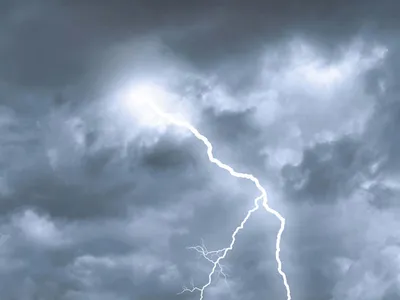Flying Into Danger
All pilots who have flown very much in
dangerous weather, have heard that small voice that begins as a whisper of
unease, more felt than heard, scratching softly at our consciousness, becoming
ever more urgent. What began as a routine flight along a line of active weather
has now become a bruised sky filled with cumulous building faster than we can
climb, still sunlit along the summits, shot through with blue-white lightning
and trailing skirts of rain, promising destruction if we choose to intrude. Like
stepping through a curtain, light becomes darkness as we enter a canyon of
storm clouds, cutting off any avenue of escape. Thunder close enough to hear,
the smell of ozone and fear. Seemingly only moments before, the sky had been
clear, the path certain and the ride benign. Out of nowhere we find ourselves
victims of fate beyond our control.
A few years ago, a simple earache that
refused to heal leads to a discussion with the doctor that includes words like
radiation and chemotherapy. As I struggle to process that news, I, along with
my wife and family enter a different, deadly storm canyon inhabited by new
realities that I do not want to acknowledge. Disoriented by the turbulence of
altered realities, we pivot from serenity to chaos.
A psychic trickle of icy water, prickling
hairs, and rising heartbeat all signal a need for action but the path to safety
is swiftly closing as we fly into the first heavy downdraft that slams us
against the restraints. I glance quickly at the wings to confirm they are still
attached knowing that if this were not so I would never know. Adrenalin floods
my brain and stretches seconds to hours as I try in vain to hold our attitude,
having forsaken any hope of maintaining heading or altitude. Now truly
frightened by the level of turbulence, I reduce the power and tighten my grip
on the controls. I tell myself to just hold the course and this will be over
soon, but I am beginning to appreciate the difference between fright and fear.
Fright comes on suddenly, grabbing my mind like a hand around my throat from
the knowledge that this is something I have never seen. But for fright to
become fear, it needs time to marinate. Then, if not controlled, fear can turn
to panic, removing all hope of survival. As the new reality sets in, I feel a
deep sense that this may not end well. So, I push back against the rising flow
of the river fearing I am losing the battle.
As treatments stole the strength to do the
simplest of things, I spent seemingly endless hours confined in cave-like
seclusion, staring into the abyss, repeating the same mantra to just hold on, stay
the course and trust that things will get better, while knowing there is a real
chance that it may not be true. Dear friends volunteer to help with the mundane
tasks to lift a bit of the burden but used to being in command, it is hard to
turn over the controls. Now, instead of GPS and glass cockpits, my world
includes MRIs and linear accelerators. Beeping, buzzing, blinking, a technology
I know nothing about.
I key the microphone and advise the air
traffic controller that we are encountering continuous moderate turbulence,
occasionally severe, and need a vector to better weather. The veteran
controller can sense the tension in my voice, for he has heard it many times
from others who have gotten in over their heads. He reports heavy returns on
the radar in all quadrants but offers a heading towards the only opening in the
squall line reaching across our horizon. I lower my seat, tighten the belt and
bank toward the assigned course. Almost immediately as we are swallowed by the
storm, there is a tremendous rush of water against the windshield as torrents
of rain obscure any view forward. The airplane groans from the stress of loads
imposed by the wind shear as we cross from updraft to downdraft and back again.
I am now truly afraid, knowing I am no
longer able to influence the outcome. Events have conspired to remove me from
the equation as an emotional river rushes forward and I struggle to stay
afloat. My wasting body shudders along, responding sluggishly, slowly growing
tired of the battle, dependent now on a feeding tube and a wife who suffers as
much as I. As we near the end of treatment, it gets harder to do even simple
things, but knowing we are almost finished keeps me holding on. The medical
team plots my course, navigating the science, providing cautious assessments
dispensed with lots of caveats.
Suddenly there is a tear in the curtain of
clouds with a small glimmer of daylight in the distance. We hurtle through the
gap and like a surge of water through a spillway, are ejected from the
darkness, returned into a gentle world of calm winds and clear skies. As the
ride smooths out, it is as if it had all been a nightmare, not real. But a
quick glance behind confirms the truth and I catch myself staring at the
receding storm.
In the week
following the end of treatment, misery
grows to the point that I just want resolution, one way or another. Then,
suddenly, as if a switch were flipped, I feel a small surge of returning
strength and life. The trajectory turns upward.
The controller again asks for our flight
conditions, but I do not respond, too busy trying to calm my trembling mind and
worried that my voice would betray a rising river of regret. Thoughts and
questions; “How had I let this happen? Why didn’t we delay or cancel or turn
back? What was I thinking? combine to carve channels of memories both important
and terrible.
In the weeks that follow, strength and life
slowly return. The battle is over for now, but the thought of another
engagement, uppermost in mind, is slow to fade. Every new ache, or twinge
generates a psychic chill. All will bear watching, much like distant returns on
the radar, but so far, the skies are clearing. Each day brings a growing calm.
Other battles remain including medical certification hurdles necessary to
return to the left seat, but those will come soon enough. For now, it is enough
to know the course.
There are lessons to learn from adversity
if we pay attention. I do not know them all, but I am trying. Simple, special
everyday moments matter more. The value of reflection, the warmth of family,
the gift of additional adventures coupled with a visceral knowledge that our
time is limited and should not be wasted. Like any dangerous encounter, if we
survive, we gain experience that offers perspective about future challenges.
Smart pilots learn to listen to that quiet
voice of experience, to sit up and pay attention. They consider the source of
their uncertainty and begin to make an alternative plan before it is too late.
Those with too little experience or an excess of arrogance often end up in
places where, with skills and knowledge insufficient to the challenge, they are
at the mercy of fate. Of these, some of us, the lucky ones, escape, having
learned our lessons, and like a novitiate stumbling in his robes, vow to never
go there again. The rest, unforgiven of their trespass, come to a quick and
deadly end.




Comments
Post a Comment